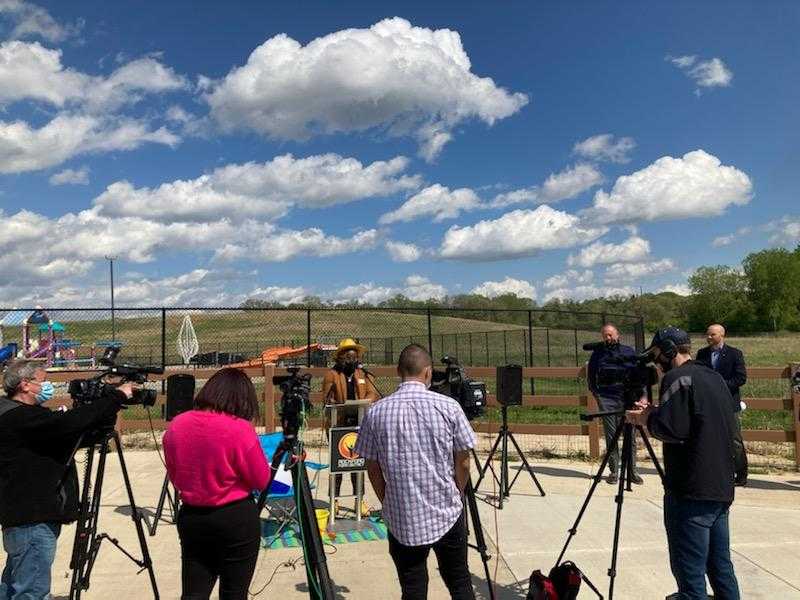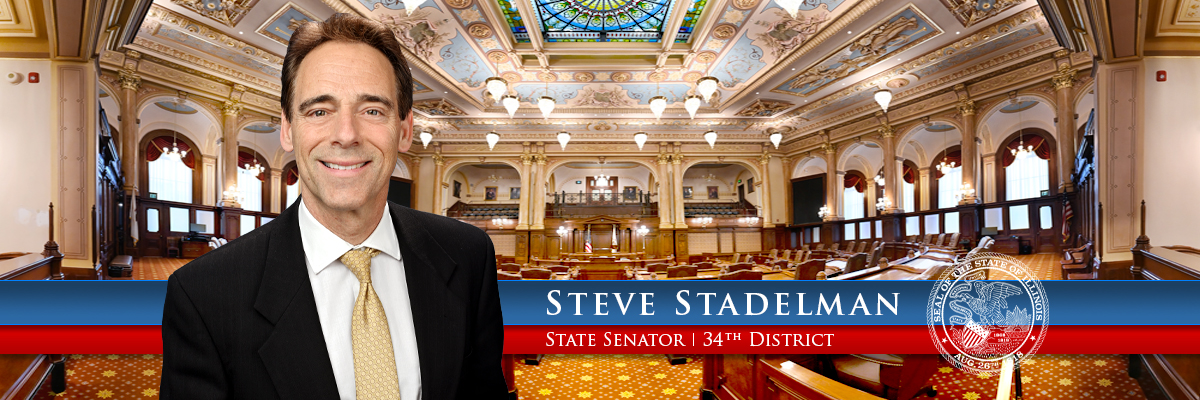- Details
- Category: Press Releases

LOVES PARK - After being closed for three summers, Sand Park Pool will reopen June 12, in large part because State Senator Steve Stadelman secured $260,000 to make critical repairs and upgrades.
The public pool shut down in 2018 when the Rockford Park District could neither afford nor further delay deferred maintenance that included concert repairs and replacement of filters and chemical controls. At the same time, environmental remediation was about to begin on the former Sand Park landfill site, including the conversion of a sledding hill and golf driving range into a nature preserve.
Senator Stadelman dedicated $260,000 in ReBuild Illinois capital funds for the needed repairs to save the pool as a summertime recreational opportunity for Loves Park families. Besides the pool repairs, state funds awarded through Stadelman also are paying or will pay for LED lighting, new motors for water slides in "Penguin Pond" wading pool and oversized, permanent "funbrellas" to offer shade.
"Sand Park Pool is one of many Rockford Park District amenities that improve our quality of life and make our region an attractive place to live," Stadelman said. "I believe investing in our recreational infrastructure is a smart use of state resources."
Stadelman recently pledged $2.5 million in capital funds at his disposal to help address $6 million in deferred maintenance that had threatened to permanently close Riverview Ice House in downtown Rockford, among other Park District initiatives for which he has obtained financing since taking office in 2012.
Sand Park was scheduled to reopen in 2020, but COVID-19 prevention required the Park District to close all three of its public pools last season. The other two, Alpine and Harkins, are scheduled to open June 19. All three will require online reservations for two-hour blocks of time.
"Reopening of Sand Park and our other public pools signals, I hope, a return to normalcy this summer despite the ongoing global pandemic -- or at least a big step in that direction," Stadelman said. "It's an opportunity for kids and families to get outdoors and enjoy summer activities that has been sorely missed in Loves Park."
- Details
- Category: Press Releases

SPRINGFIELD – A measure co-sponsored by State Senator Steve Stadelman (D-Rockford) that would support investment in downtown Rockford passed the Illinois Senate.
“Since the River Edge Historic Tax Credit was created, the city of Rockford has experienced economic growth and significant restoration,” Stadelman said. “This extension will allow these investments to continue and further revitalize Rockford.”
Rockford has seen a significant amount of new development, largely due to the River Edge Historic Tax Credit Program, which gives a state income-tax credit to the owners of historic structures matching 25% of rehabilitation project costs.
“This tax credit has brought life to many historic buildings, which helps boost property values in the area,” Stadelman said. “I hope to see this program continue to bring in more successful projects, like the Embassy Suites Hotel downtown.”
The historic Ziock/Amerock building where the hotel is located had been vacant for over 25 years before the restoration project supported by the River Edge Historic Tax Credit Program took place.
Originally set to expire at the end of 2021, the legislation would continue the River Edge Redevelopment Zone tax credit through the end of 2026. The tax credit has also helped revitalize parts of Aurora, East St. Louis, Elgin and Peoria.
Other examples of projects made possible by the program are Prairie Street Brewhouse, the Rockford Trust Building, Midtown Lofts and the Handley Building, all located downtown.
Senate Bill 157 passed the Illinois Senate and now awaits further consideration in the Illinois House of Representatives.
- Details
- Category: Press Releases

SPRINGFIELD – State agencies and institutions could only purchase American and Illinois flags manufactured in the United States under a measure sponsored by State Senator Steve Stadelman (D-Rockford) that passed committee Wednesday.
“This is the right thing to do. As a government, we have no business flying our state and nation’s flags if they aren’t made in America,” Stadelman said. “Supporting our local businesses and economies should always take priority.”
The measure would change the Flag Display Act to no longer allow state institutions or agencies to purchase American and Illinois flags from manufacturers outside of the U.S.
“Our state agencies and institutions purchase flags every year,” Stadelman said. “This will ensure those flags are American made.”
Under the Flag Display Act, flags are designated to be necessary supplies for institution and agency budgets.
House Bill 605 passed the Senate State Government Committee without opposition and now heads to the Senate floor for further consideration.
- Details
- Category: Press Releases

SPRINGFIELD – Schools that teach sex education would be required to include a lesson about the risks of sexting under a measure sponsored by State Senator Steve Stadelman (D-Rockford), which passed committee Tuesday.
“The last time this curriculum was updated, technology was not as advanced as it is today,” Stadelman said. “This measure would modernize our state’s education standards to include sexting so our children know the long-term effects and consequences of what may seem like a harmless act.”
The measure would require schools that offer a sex education course or unit to modify their current curricula to include an age-appropriate lesson on sexting and its potential consequences.
“Students need to know about the real-life consequences of sexting,” Stadelman said. “How do we expect them to make an informed decision if they aren’t taught the dangers of sending or sharing sexually explicit messages?”
The measure was introduced by State Representative Maurice West (D-Rockford), Stadelman’s counterpart in the Illinois House of Representatives.
House Bill 24 passed the Senate Education Committee with a vote of 10-5 and now heads to the Senate floor for further consideration.
More Articles …
Page 54 of 112




